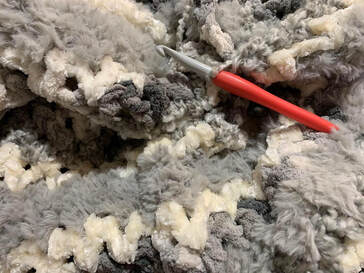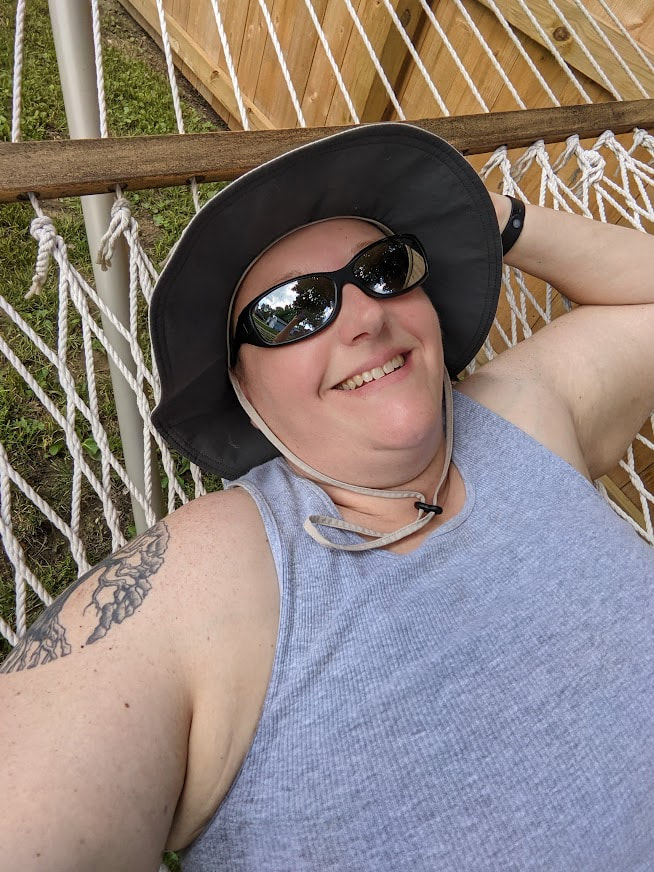 Some of you know that I met my spouse online. One of the things I loved about their profile was that they said that they were good at “pulling things together with sticks and string.” Since those early days, I have seen the ways these words have come to fruition in our daily lives. My spouse is excellent with a budget–they know how to scour the weekly grocery ads to find bundles and deals that make our grocery budget stretch. They are excellent with throwing meals together from what seems like nothing, and they are excellent at making old things new with a few learned skills, patience, and some ingenuity. But they are also EXTREMELY gifted in pulling things together with literal “sticks and string.” My spouse is a practitioner of the fiber arts. They knit, they crochet, they do cross stitch and they make quilts. When I complained about only ever owning afghans that covered mere halves of my body, my spouse measured me and made me a beautiful two-toned blue afghan that lets me tuck my chin AND my toes in. They made their father, a veteran of the Vietnam war, a quilt of valor, and their mother a flying geese-patterned quilt complete with an applique patch of the face of their mom’s late boxer, Mollie. They even attend a weekly local fiber arts group at the Oskaloosa Arts Center, led by our own Julia Fairchild, whenever they are able. Perhaps the thing that strikes me the most about ALL of this is the way in which fiber arts helps pull my spouse’s attention into the present with “sticks and string.” When they are trying to listen and really take in what is being said, my spouse does this best with a crochet, knitting, or cross stitch project in hand. When they want clear their mind from the clutter and the noise around them, a trip to the quilting room helps. Their presence is most fully brought to fruition when they have something to do with their hands. And it’s not just my spouse, I went to seminary with people who never took one note in class, but ALWAYS had some fiber arts project with them, helping them to be present. Even in social functions, these same students could be found chatting and stitching or hooking and looping–fully present. Fully absorbed in the moment. Conversations and classes–even worship services–weren’t things they just had to “get through,” they were opportunities for more fiber arts and for more presence. I don’t have that skill, and I don’t have the desire to cultivate fiber arts as a skill, but I do have a desire to be more present. I do have a desire to do more than just “get through” conversations, classes, and even worship services. I do have a desire to be more present to you, to what’s going on around me, and the work of God in, through, and around me…I wonder if you do too? In worship, I have found that closing my eyes during certain songs and responses grounds me and keeps me present. Outside of worship, I have found that closing my computer and turning off my phone helps me to be more present in meetings and in conversations. Being an active participant in conversations and asking lots of questions also helps me be more present. And as you know, in the mornings, it is the birds, a cup of coffee, and a rocking chair on our porch that tunes me into God, Creation, and what’s going on inside of me. Eckhart Tolle once wrote, “Realize deeply that the present moment is all you ever have. Make the Now the primary focus of your life.” I love that, and not only because I believe it to be true–that the present moment is all we ever have–but also because he doesn’t say how. The truth is we will all find myriad pathways to “the Now.” We will each find our own unique grounding in the present moment. We will each find what works for us to learn, to listen, to take in, to absorb. We will each find our own ways to do more than just “get through” the present moment–even when it feels like “getting through” is all we have the strength to do. We can and will find what uniquely grounds each of us there–in our worship, in our conversations, in our grief, and in our joy. And as we find what grounds us and practice it, the present moment becomes primary and, indeed, all that we have. My spouse does fiber arts. I close my eyes and ask questions. My mother twiddles her thumbs. Others doodle or use fidget objects. Others take deep breaths at key moments. There is no wrong way to be present to the present moment or to the Presence at work in our lives. And since church is one place where we can practice being present, I want to encourage you to do whatever you need to do to be present during worship, or church meetings, or rummage sales, or ice cream socials–whatever. If fiber arts help you be present in worship, bring your current project. If closing your eyes helps you be present, then join me in closing them as often as you need. If twiddling your thumbs, doodling on the bulletin, using a fidget object, or taking deep, loud, audacious breaths helps ground you in the present, then I’ll listen for you on Sunday morning. For it is our presence to one another, our truest selves, and to the One who is always present with us that saves us, that changes us, and that pulls us together when everything seems to be falling apart–even if it does so with sticks and string. I hope to see your "presence projects" on Sunday, Pr. Melissa Comments are closed.
|
Rev. Melissa Sternhagen
Rev. Melissa Sternhagen was called as the pastor of St. Paul Congregational UCC in June of 2020. Prior to her call to St. Paul, Pr. Melissa worked as a hospice chaplain in the Ames, IA area, following pastorates at rural churches in Central Iowa and Southern Illinois. Pr. Melissa is a second-career pastor with a background in agribusiness and production & supply operations. She received her M.Div. from Eden Theological Seminary in St. Louis, MO, and holds a MA Ed. in Adult Education and Training, and a BA in Organizational Communications. Archives
July 2024
Categories |

 RSS Feed
RSS Feed
